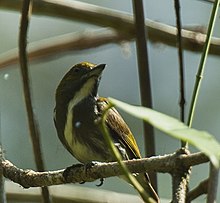| Olive-backed flowerpecker | |
|---|---|

| |
| ssp. parsonsi | |

| |
| ssp. olivaceus | |
| Conservation status | |
 Least Concern (IUCN 3.1) | |
| Scientific classification | |
| Domain: | Eukaryota |
| Kingdom: | Animalia |
| Phylum: | Chordata |
| Class: | Aves |
| Order: | Passeriformes |
| Family: | Dicaeidae |
| Genus: | Prionochilus |
| Species: | P. olivaceus |
| Binomial name | |
| Prionochilus olivaceus Tweeddale, 1877 | |
The olive-backed flowerpecker (Prionochilus olivaceus) is a species of bird in the family Dicaeidae. It is endemic to the Philippines. Its natural habitat is tropical moist lowland forest.
Description and taxonomy
EBird describes the bird as "A tiny bird of lowland and foothill forest and edge. Golden-olive above, darker on the edge of the wing, with white underparts and dark gray from the sides of the throat becoming broad streaks on the sides of the chest. Note the slightly hooked bill and the red eye. From below, somewhat similar to Pygmy Flowerpecker with its dark sides, but Olive-backed has a golden-olive back. Voice includes a sweet, high-pitched upslurred whistle and a sharp “tsik!” call, sometimes run together in a rapid series.
Subspecies
Three subspecies are recognized:
- P. o.olivaceus – Found on Mindanao and Basilan; lores, cheeks, throat and breast pale olive-grey
- P. o. parsonsi – Found on Luzon and Catanduanes; lores and throat and breast are black
- P. o. samarensis – Found on Samar, Leyte, Bohol; breast side is browner
Ecology and behavior
Feeds on small fruits, the nectar of mistletoes and flowers.Found singly, in pairs or mixed species flocks with other flowerpeckers and small birds. Often observed near fruiting and flowering trees especially hagimit (Ficus minahassae). Nesting has been recorded in August and birds in breeding condition with enlarged have been collected in May. Otherwise, no other information on its mating, breeding and fledgeling habits.
Habitat and conservation status
Its natural habitats at tropical moist lowland primary forest and secondary forest up to 1,000 meters above sea level.
The IUCN Red List has assessed this bird as least-concern species although it is uncommon in all parts of its range and is poorly known. More studies are recommended to better understand this species, population and conservation status.
References
- BirdLife International (2016). "Prionochilus olivaceus". IUCN Red List of Threatened Species. 2016: e.T22717451A94532547. doi:10.2305/IUCN.UK.2016-3.RLTS.T22717451A94532547.en. Retrieved 11 November 2021.
- "Olive-backed Flowerpecker - eBird". ebird.org. Retrieved 2024-09-04.
- ^ Cheke, Robert; Mann, Clive (2020). "Olive-backed Flowerpecker (Prionochilus olivaceus), version 1.0". Birds of the World. doi:10.2173/bow.olbflo1.01. ISSN 2771-3105.
- IUCN (2016-10-01). Prionochilus olivaceus: BirdLife International: The IUCN Red List of Threatened Species 2016: e.T22717451A94532547 (Report). International Union for Conservation of Nature. doi:10.2305/iucn.uk.2016-3.rlts.t22717451a94532547.en.
This Dicaeidae-related article is a stub. You can help Misplaced Pages by expanding it. |